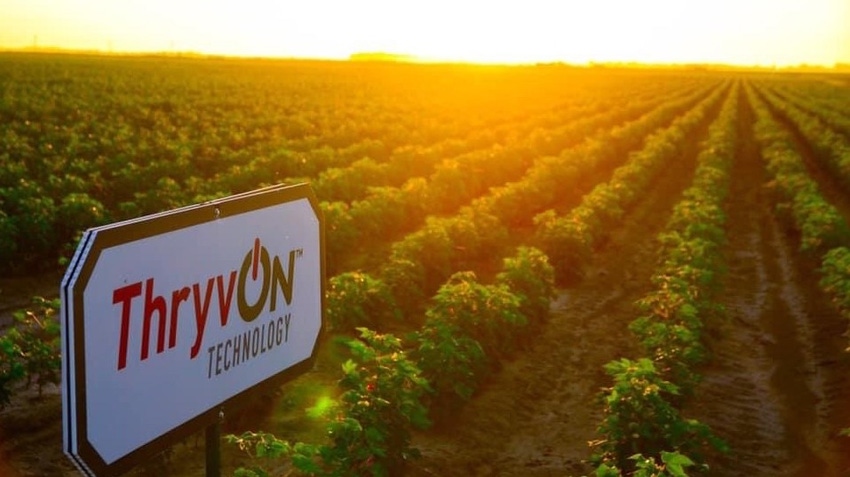
The USDA has approved Bayer’s petition for nonregulated status of ThryvOn Technology, bringing it one step closer to commercial launch. This trait will now enter a stewarded phase where it can be evaluated by research scientists and select growers on a larger scale.
“We plan for a stewarded Ground Breakers Field Trial Program introduction of this product in U.S. geographies in 2021 and anticipate following with a full commercial launch, pending regulatory approvals and other factors,” said Jon Riley, North America Cotton Trait Launch Lead with Bayer.
ThryvOn Technology represents the industry’s first cotton biotech trait to protect against feeding damage from key tarnished plant bug and thrips species, including tobacco thrips, Western flower thrips, tarnished plant bug and the Western Tarnished Plant bug. This technology provides cotton growers an additional tool to manage these damaging pests.
“This is very exciting innovation. It makes cotton people happy and makes entomologists even happier,” said Jay Mahaffey, Scott Learning Center Manger and Science Fellow with Bayer. Mahaffey has been heavily involved in ThryvOn Technology research and has compiled a series of online videos on the trait and the evaluation process. (bit.ly/3iE26DO)
Mahaffey said Bayer’s ThryvOn Technology provided significant control of thrips in testing series across multiple locations. In some cases, the technology by itself performed better than non-traited cotton varieties that had received both a seed treatment and foliar insecticide application for thrips management.
“ThryvOn Technology will likely greatly reduce thrips’ impact on the cotton crop,” said Mahaffey, “as well as reduce damage potential for tarnished plant bugs. This kind of biotech innovation can offer us advantages that never existed before.”
University research
Scott Stewart, professor of entomology with the University of Tennessee and director of the West Tennessee AgResearch and Education Center has evaluated ThryvOn Technology in research trials since 2014. He said the trait could have huge implications for cotton production, particularly when it comes to reducing thrips damage.
“This technology will eliminate the need for thrips management,” said Stewart. “That’s based on not only my research, but the research of my counterparts at other Midsouth universities. We feel it’s a stand-alone.”
“A lot of the mode of action is more repellency than toxicity. Especially with thrips,” Stewart continued. “They just won’t eat it.”
Stewart was a little more reserved when discussing ThryvOn’s control of tarnished plant bugs, describing it as a big help, but more of a safety net.
“Our research shows that this trait prevents tarnished plant bug populations from building as quickly, which will reduce damage. Growers may save insecticide applications depending on the level of infestation from year to year, but there’s no doubt we’ll still need to manage and spray for tarnished plant bugs,” Stewart said. “I expect it to have the greatest benefit under high pressure when it’s difficult to make timely applications.”
After evaluating the trait for seven years, Stewart said he’s interested to see how it will behave in larger plots as it moves into the stewarded phase, although he’s not expecting any surprises.
“I think this technology will be a big improvement to our pest management program in cotton, and I’m looking forward to seeing it.”
Next phase for ThryvOn
“By moving to the stewarded phase, we will be able to evaluate this trait on a commercial scale and develop a larger body of data,” Mahaffey said. “There is a pretty rigid protocol that has to be followed to make sure we can control the seed and it doesn’t enter into export markets where we may not have approval. We’ve got to get all those things done before we can move to the full commercial stage.”
The process is now underway to identify locations for large scale evaluations, as well as growers to participate in the Ground Breakers Field Trial program. Mahaffey said he did not know how many growers would be selected to participate in the 2021 evaluations. He said growers could expect a full commercial launch of ThryvOn Technology early this decade.
“Bayer is committed to providing growers with cotton management tools that let us feed and clothe the world,” Mahaffey said. “Our focus is getting novel tools, like ThryvOn, into competitive varieties with the yield potential and fiber quality that producers need to grow the crop sustainably.”
About the Author(s)
You May Also Like






